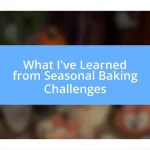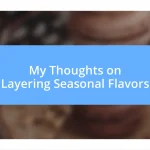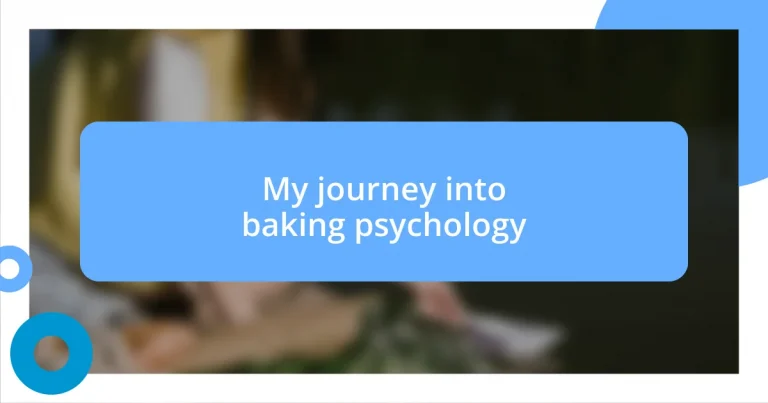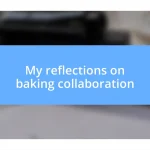Key takeaways:
- Baking is a therapeutic process that enhances emotional well-being through creativity and stress relief.
- Understanding baking science, such as the Maillard reaction and ingredient temperature, is crucial for achieving desired textures and flavors.
- Challenges in baking provide opportunities for learning and creativity, transforming perceived failures into innovative outcomes.
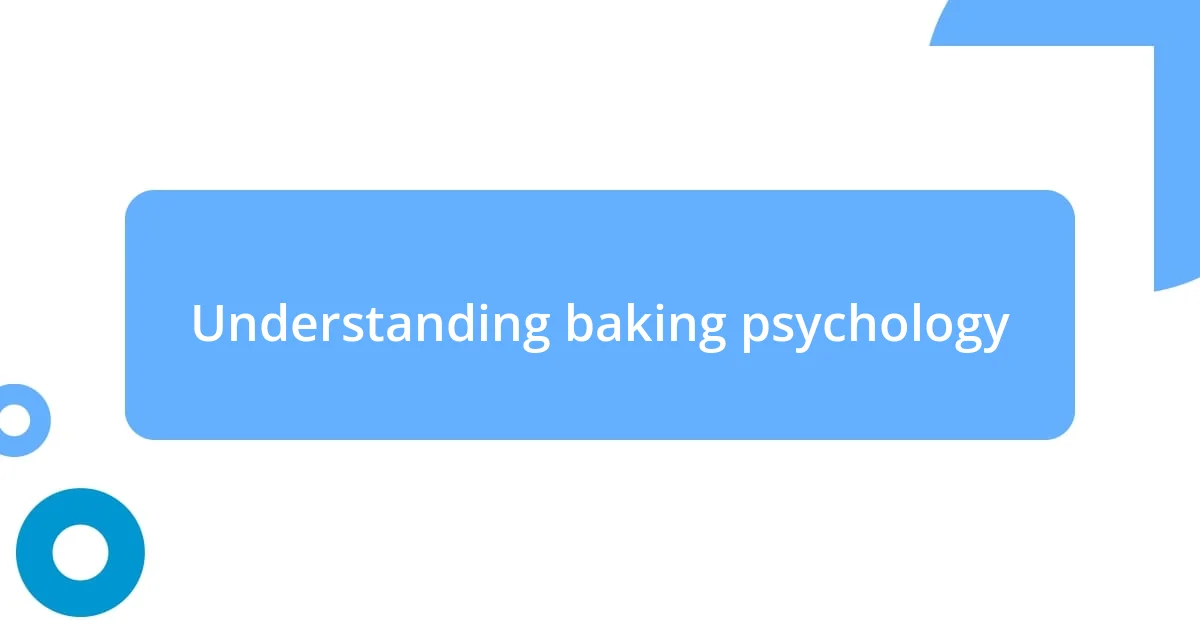
Understanding baking psychology
Baking isn’t just about mixing ingredients; it’s an emotional experience that intertwines our memories, moods, and motivations. I still remember the warm, comforting scent of my grandmother’s gingerbread cookies wafting through the house during the holidays. That aroma brought a wave of nostalgia that seemed to magically lift my spirits. Isn’t it fascinating how certain smells can transport us back to cherished moments in time?
When I think of baking psychology, I can’t help but consider how the act of baking itself can be a therapeutic process. The rhythm of kneading dough or the precision of measuring flour creates a meditative state. Have you ever noticed how the simple act of creating something with your own hands can provide a welcome escape from life’s chaos? For me, it serves as an outlet for creativity and a way to refocus my thoughts, helping to alleviate stress.
Moreover, the psychological impact of sharing baked goods shouldn’t be underestimated. I can vividly recall the joy in my friend’s eyes when I brought over a batch of cupcakes to celebrate her promotion. Sharing food often strengthens connections and fosters a sense of community, don’t you think? This aspect of baking not only brings joy to others but also enriches our own emotional lives, weaving deeper connections through the act of creation.
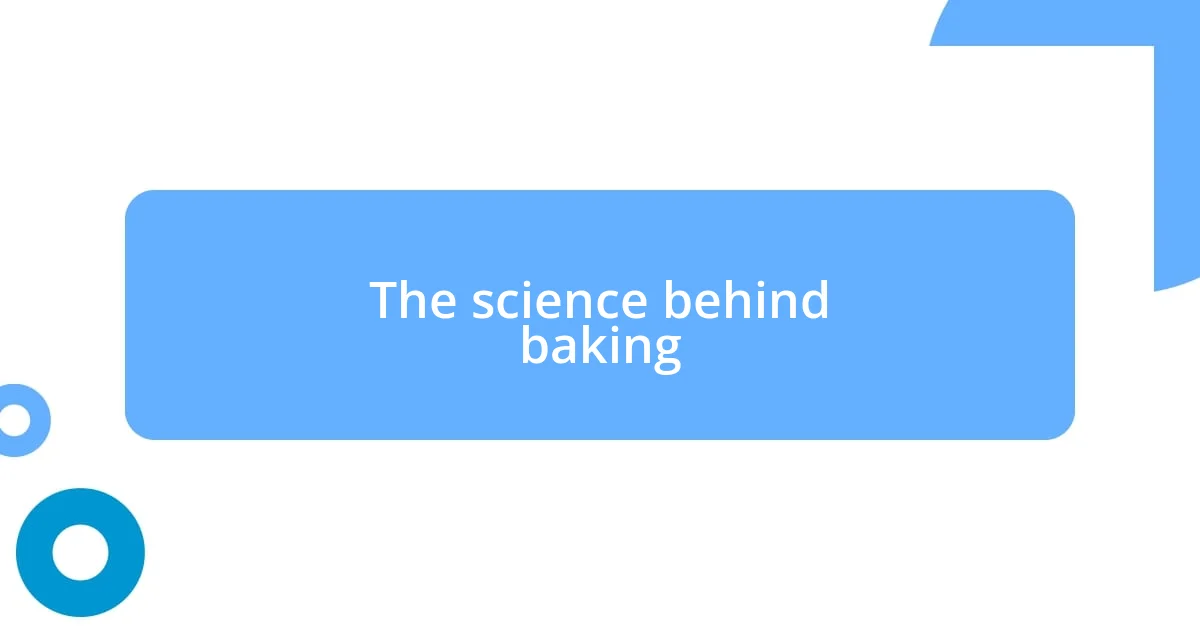
The science behind baking
Baking is an intricate blend of science and art, where precise chemical reactions create the delightful textures and flavors we love. For instance, the Maillard reaction, which occurs when proteins and sugars react during baking, generates that gorgeous golden brown crust on cookies and bread. I find it intriguing how these scientific principles can make or break a recipe, transforming ordinary ingredients into something extraordinary.
In my own experience, understanding the role of temperature has been a game changer. Did you know that the temperature of your ingredients can significantly alter the outcome of your baked goods? When I first started baking, I used cold butter for cookies, and they turned out flat and greasy. Once I learned that room-temperature butter results in a fluffy texture, my cookies finally reached their full potential. Isn’t it fascinating how a simple adjustment can lead to such a dramatic difference?
Another key aspect of baking science is the importance of timing. Each step in the baking process, from mixing to baking duration, relies on timing to ensure the ingredients interact properly. I’ve had moments when impatience got the best of me, and I pulled a cake out of the oven too soon. The result? A gooey, sunken middle that taught me a valuable lesson: patience is crucial in achieving perfection.
| Scientific Principle | Impact on Baking |
|---|---|
| Maillard Reaction | Creates flavor and color in baked goods |
| Ingredient Temperature | Affects texture and rise |
| Baking Duration | Determines doneness and moisture content |
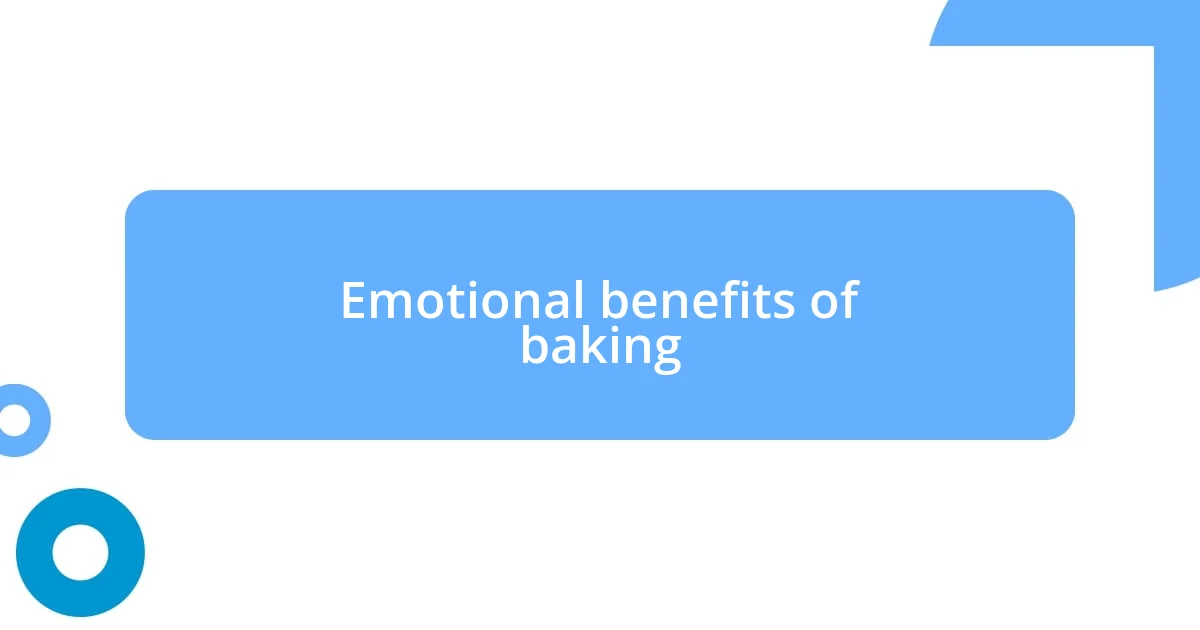
Emotional benefits of baking
Baking has a wonderful way of elevating our emotional well-being. I often find myself lost in thought while whisking together eggs and sugar, almost as if each beat of the whisk shakes off the stress of the day. The tangible nature of baking makes it a unique form of self-care. Engaging all my senses in the process can shift my mood significantly, transforming anxiety into joy.
Here are some emotional benefits I’ve experienced through baking:
- Stress Relief: The repetitive motions of mixing and kneading can be incredibly soothing.
- Creativity Boost: Experimenting with flavors and designs fuels my creative spirit.
- Sense of Achievement: I feel a genuine sense of pride when I pull a perfectly baked treat from the oven.
- Connection to Memory: Each recipe often brings back cherished moments, whether from childhood or significant life events.
- Joy of Sharing: Offering baked goods to friends and family creates a sense of belonging and connection that enriches my life.
When I bake, it’s as if I’m creating little moments of happiness—not just for myself, but for those around me. I recall the last time I baked a loaf of banana bread, filling the kitchen with its sweet aroma. That smell had my neighbors knocking at my door with smiles, and it sparked delightful conversations that left us all feeling a bit lighter. It’s amazing how a simple act of baking can foster these deeper connections and add layers of joy to my everyday life.
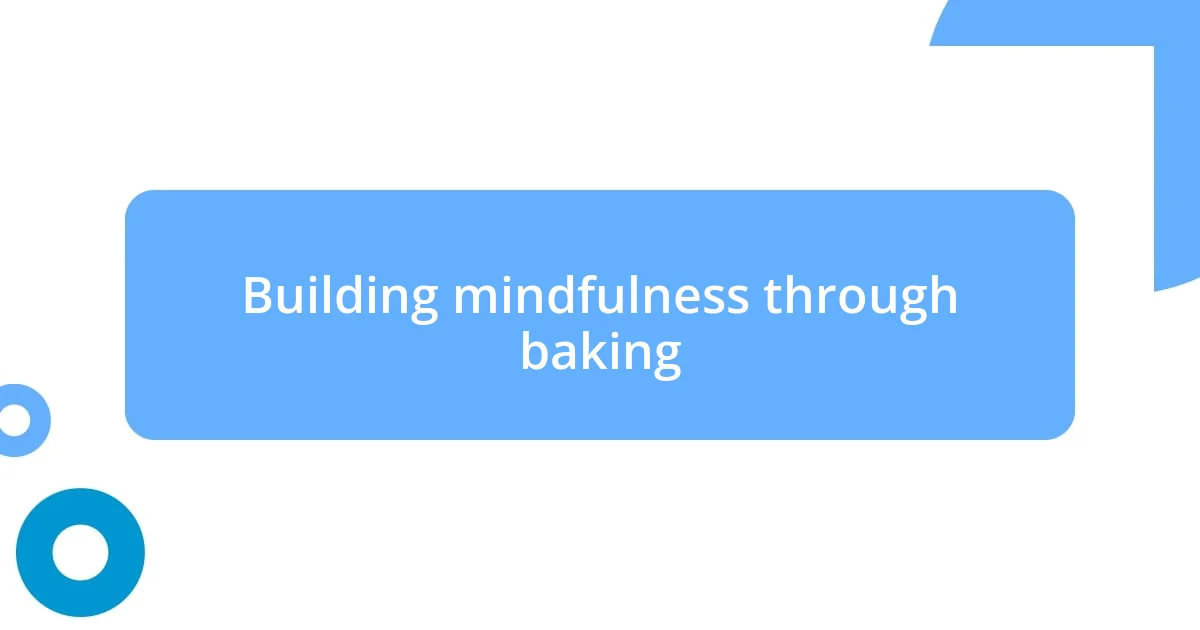
Building mindfulness through baking
While baking, I often find myself fully immersed in the moment. There’s something grounding about measuring flour, sifting cocoa powder, and kneading dough that centers my thoughts. Have you experienced that focus where everything else fades away? It’s almost meditative, allowing me to embrace each step without distractions.
One evening, while preparing a batch of blueberry muffins, I realized how the vibrant colors of the ingredients lightened my mood. As I mixed the batter, the process began to feel like an artistic endeavor rather than a mere task. The aroma of baking muffins wafting through my home filled me with joy, reminding me of Sunday mornings spent with my grandmother. What better way to reinforce positive memories than through the act of baking?
Baking also encourages me to practice patience, a quality I sometimes struggle with. I’ve learned that the wait for cookies to cool is just as crucial as the baking time itself. It’s a lesson in savoring the moment, and when I finally take that first bite, it often reminds me to appreciate the small victories in life. Isn’t it rewarding to take a moment, breathe, and truly enjoy the fruits of your labor?
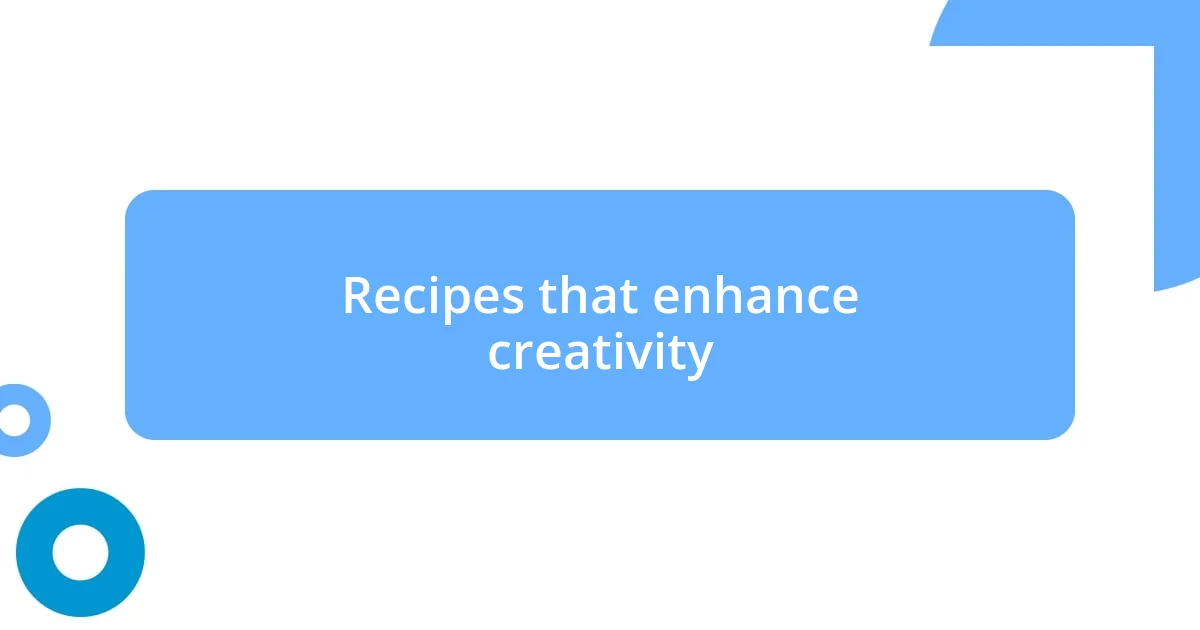
Recipes that enhance creativity
When it comes to recipes that enhance creativity, I’ve discovered that experimenting with unique flavor combinations can unlock a world of inspiration. Recently, I decided to whip up a lavender and lemon shortbread cookie recipe. As I delicately infused the lavender into the butter, I felt like an artist mixing colors on a palette. Isn’t it fascinating how unexpected ingredients can ignite our imagination?
I also enjoy baking with friends, which adds an extra layer of creativity to the process. One memorable afternoon, we teamed up to create a colorful rainbow cake. Each layer was an explosion of color, and we even decorated it with edible glitter. The laughter and shared excitement were just as satisfying as the final product. Have you ever felt that collective energy while cooking with others? It really brings out the best in our creative spirit.
In my experience, the textures and aesthetics of baking can be as important as the taste. I often choose to bake things like doughnuts, where I can experiment with glazes and toppings. There’s something truly exhilarating about crafting a fluffy doughnut and then transforming it into a masterpiece with vibrant sprinkles or a rich chocolate glaze. That final flourish not only enhances the visual appeal but also fuels my imagination for future creations. How can we not feel accomplished when our baked goods become a feast for both the eyes and the palate?
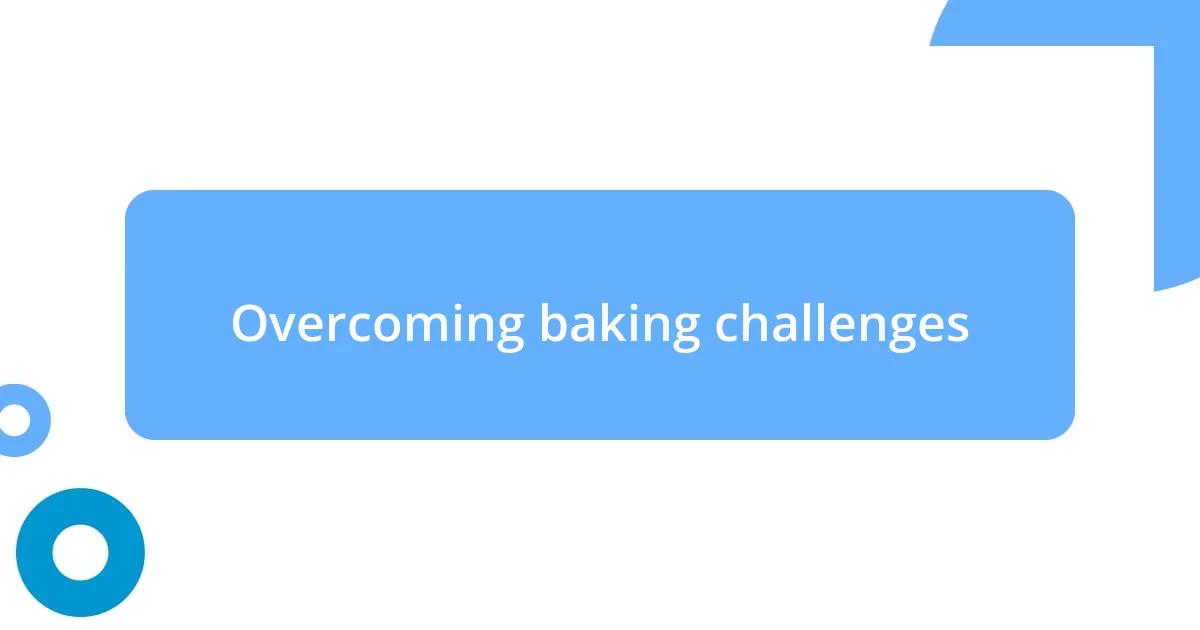
Overcoming baking challenges
Baking challenges can sometimes feel overwhelming, but I’ve found that each obstacle contains a spark of opportunity. I remember the first time I attempted a soufflé; I was filled with equal parts excitement and dread. When it collapsed, I could’ve been disheartened, but instead, I saw it as a fun excuse to experiment with flavors and learn more about the science behind baking. Have you ever turned a perceived failure into a launching pad for creativity?
I often encounter moments when my baked goods don’t turn out as I envisioned. One day, while trying a new recipe for macarons, I faced the dreaded issue of cracked shells. Instead of giving up, I dove into research, learning about humidity and proper folding techniques. I’ve come to realize that these challenges teach me more than any perfect bake ever could. It’s a journey of discovery; don’t you love the way perseverance can lead to unexpected triumphs in the kitchen?
Sometimes, embracing those challenges can lead to surprising results. I once had an entire batch of cookies turn rock-hard because I mismeasured the flour. Instead of tossing them, I crumbled them into a glass of milk, and voilà! I had a delightful cookie crumble dessert. That moment reminded me of the importance of flexibility and innovation in the kitchen. Isn’t it fascinating how a little creativity can transform a mistake into a delicious new treat?
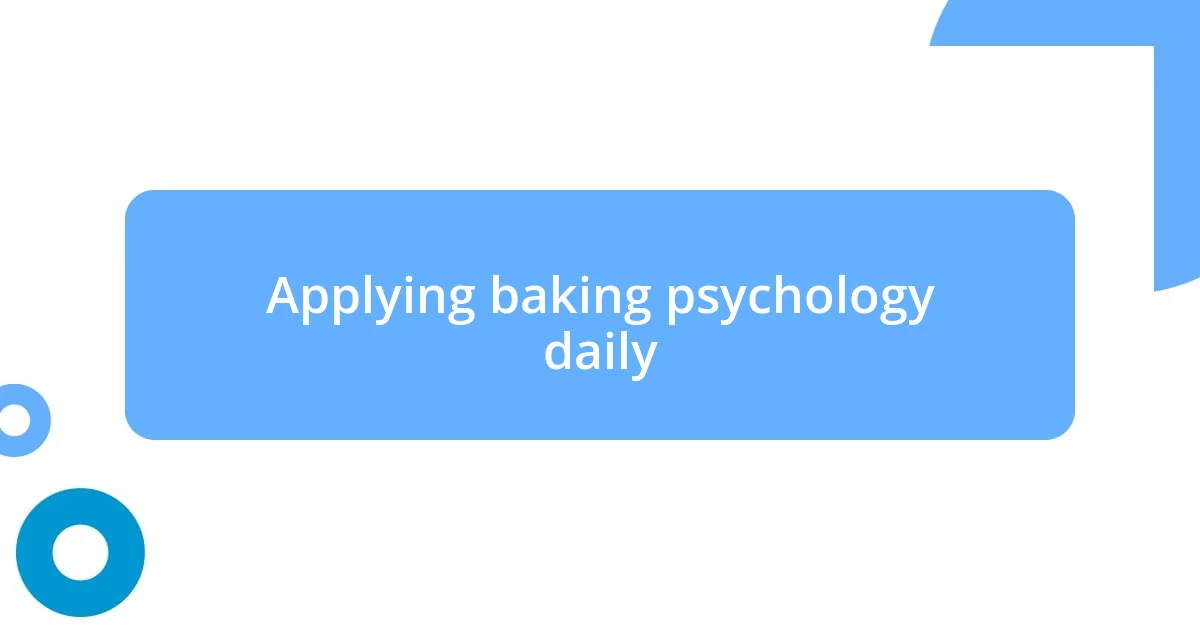
Applying baking psychology daily
Applying baking psychology daily can be a transformative experience, and I’ve seen how consciously engaging with my baking can impact my mood and creativity. For instance, when I’m feeling stressed, I often find solace in kneading dough. The rhythmic motion is oddly therapeutic, providing both physical release and mental clarity. Have you ever noticed how a simple act of kneading can shift your mindset?
I also make it a point to keep a baking journal. This isn’t just about recording recipes; it’s a space where I reflect on my baking experiences and emotions. Recently, I wrote about how the aroma of freshly baked bread made me feel nostalgic, reminding me of my grandmother’s kitchen. This process deepens my connection to baking as it intertwines my memories and emotions with what I create. Don’t you think that baking holds a treasure trove of memories waiting to be explored?
Moreover, I’ve learned to approach baking as a way to nurture relationships. Whenever I feel like connecting with someone, I whip up a batch of cookies and share them. Last week, I made oatmeal raisin cookies for my neighbor who had just returned from a long trip. The joy of seeing her face light up when she tasted them reaffirmed how baking can foster connection. Isn’t it incredible how a few simple ingredients can bring people together and create moments of joy?



